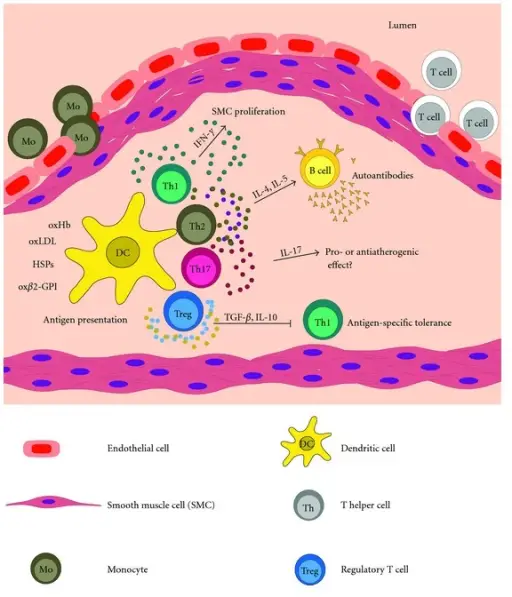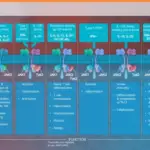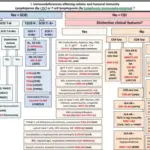
Schematic representation of T lymphocyte subset activation within atherosclerotic plaque. Different self-structures are expressed in the intima of the vessel wall and subjected to enzymatic/oxidative modifications. These modified molecules are taken up by dendritic cells and presented to CD4+ T helper cells via MHC class II molecules. Antigen presentation promotes T lymphocyte activation and secretion of different cytokines. Effector CD4+ Th1 cells produce pro-inflammatory cytokines, particularly IFN-γ, with proatherogenic effects. Activated Th2 lymphocytes secrete IL-4 and IL-5 which promote the differentiation of B cells in plasma cells and the production of specific antibodies. Some infiltrated T cells upon activation differentiate in Th17 lymphocytes characterized by the production of IL-17, but their role remains controversial. Regulatory T cells (Tregs) downregulate inflammation by secretion of TGF-β and IL-10. The pro-inflammatory mediators released by activated T cells reduce the stability of the lesion promoting plaque rupture and thrombotic events. T lymphocyte autoreactivity in inflammatory mechanisms regulating atherosclerosis. Profumo E, Buttari B, Saso L, Capoano R, Salvati B, Riganò R - TheScientificWorldJournal (2012). Not Altered. CC.
Lymphocytes are activated through antigen-specific receptors on their cell surface. This causes the cells to proliferate and differentiate into specialized effector lymphocytes. Display of antigens allows T cells to recognize antigenic epitopes presented on the surface of an antigen-presenting cell. Recognition of antigens involves direct binding of immunoglobulin to the intact antigen and antibodies typically bind to the surface of protein antigens. Cell mediated immunity is immune response that does not involve antibodies but rather incorporates the activation of macrophages and NK cells enabling them to destroy intracellular pathogens.
Humoral immunity is a form of immunity in which B lymphocytes and plasma cells produce antibodies to foreign agents (antigens) and stimulate T lymphocytes to attack them. Decline of immune response is a process associated with aging that leads to dysregulation of cells of innate and adaptive immunity, which may become dysfunctional. Immunologic memory is the ability of the immune system to respond more rapidly and effectively to pathogens that have been encountered previously, and reflects the pre-existence of a clonally expanded population of antigen-specific lymphocytes.



